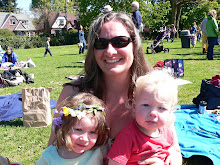Aka: What the hell is a Restoration Ecologist???
I work for a non-profit called the Friends of the Hylebos, working to preserve and restore 740 acres along Hylebos Creek. I write restoration plans for sites, critique other restoration plans, manage up to 10 sites and 30 projects a year, hire crews, order plants, recruit volunteers to assist with planting.
My job is very diverse. It is really like 5 jobs wrapped up in 1, which is probably why I like it so much. I do some botany work, as I assess the plant growth and survival on my sites every year. It's funny, cause my experience has been in fish, and now I use all my fish knowledge to work with plants. I never thought I would be able to rattle off scientific names of native plants!
About volunteers: it is true that I work with up to 300 volunteers a year, and sometimes have work parties with up to 100 vounteers at a time, but volunteers only do about 10% of my work. I use volunteers for planting and for removing invasive species, and we treat them really well. We start off with complementary coffee and bagels (I also look for donations). Poverty Bay Coffee Company keeps my volunteers going! They donate coffee to every event I put on. We work for a couple hours, and then I run out and pick up the donated pizza. The Right Spot donates pizza to every event I have, also, sometimes as many as 15 large pizzas. After lunch we work for a couple more hours. At the end, everyone is surprised at just how much we accomplished.
The volunteerism is the public part of my work, and the easiest to understand, and the smallest part timewise.
I spend a lot of time in the fall, winter and spring outside managing crews as they install plants, or remove invasive species. I have one site that is 15 acres, and has multiple types of habitat. It was a restoration site to mitigate for damage to salmon habitat done over 25 years. Now a lot of companies that did the damage are being taken to court or settling out of court, and that money is used to create restoration sites that will benefit salmon.
Subscribe to:
Post Comments (Atom)

No comments:
Post a Comment